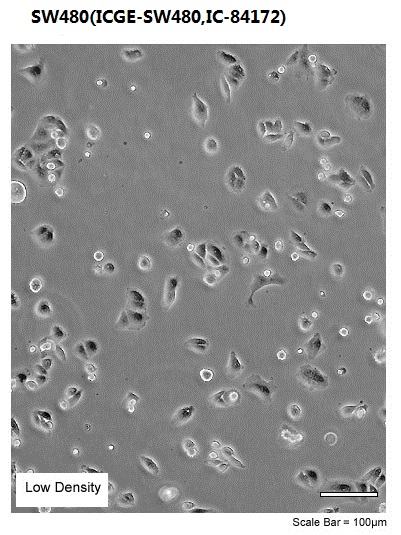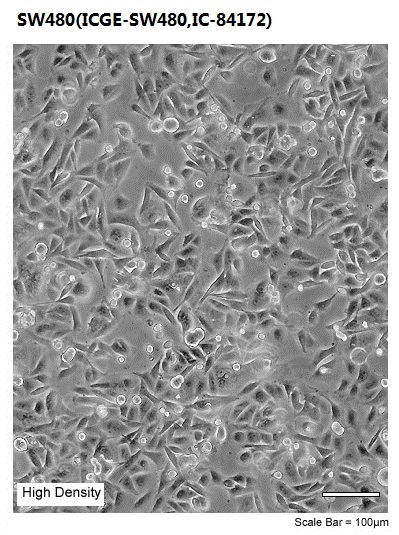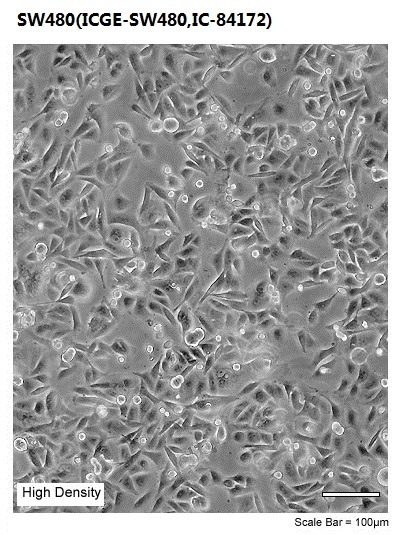


| Organism | Homo sapiens, human |
|---|---|
| Tissue | colon |
| Product Format | frozen |
| Morphology | epithelial |
| Culture Properties | adherent |
| Biosafety Level |
1
Biosafety classification is based on U.S. Public Health Service Guidelines, it is the responsibility of the customer to ensure that their facilities comply with biosafety regulations for their own country. |
| Disease | Dukes'''''''''''''''''''''''''''''''' type B, colorectal adenocarcinoma |
| Age | 50 years |
| Gender | male |
| Ethnicity | Caucasian |
| Applications |
This cell line is a suitable transfection host. This line has a mutation in codon 12 of the ras proto-oncogene, and can be used as a positive control for PCR assays of mutation in this codon. |
| Storage Conditions | liquid nitrogen vapor phase |
| Karyotype | The stemline chromosome number is hypotriploid and 11-12 marker chromosomes were common. Both double minutes and dicentrics were observed in 8% of each metaphase examined. |
|---|---|
|
|
|
| Derivation |
SW480 was established from a primary adenocarcinoma of the colon.
|
| Clinical Data |
50 years
Caucasian
male
|
| Receptor Expression |
epidermal growth factor (EGF)
|
| Oncogene | myc +; myb + ; ras +; fos +; sis +; p53 +; abl -; ros -; src - |
| Genes Expressed |
carcinoembryonic antigen (CEA) 0.7 ng/10 6 cells/10 days; keratin; transforming growth factor beta,myc +; myb + ; ras +; fos +; sis +; p53 +; abl -; ros -; src -,HLA A2, B8, B17; blood type A; Rh+,The cells are positive for keratin by immunoperoxidase staining.,The line is positive for expression of c-myc, K-ras, H-ras, N-ras, myb, sis and fos oncogenes.
|
| Cellular Products |
carcinoembryonic antigen (CEA) 0.7 ng/10 exp6 cells/10 days; keratin; transforming growth factor beta
|
| Tumorigenic | Yes. Tumors developed within 21 days at 100% frequency (5/5) in nude mice inoculated subcutaneously with 10(7) cells. |
| Effects |
Yes, in nude mice
|
| Virus Susceptibility |
Human immunodeficiency virus 1 , Human immunodeficiency virus 1 |
| Comments |
A cell line established from a lymph node metastasis taken from the same patient one year later is available (see ATCCCCL-227). The line is negative for CSAp (CSAp-) and colon antigen 3. The cells are positive for keratin by immunoperoxidase staining. There is a G -> A mutation in codon 273 of the p53 gene resulting in an Arg -> His substitution and a C -> T mutation in codon 309 resulting in a Pro -> Ser substitution. The cells express elevated levels of p53 protein. The line is positive for expression of c-myc, K-ras, H-ras, N-ras, myb, sis and fos oncogenes. N-myc oncogene expression was not detected. Matrilysin, a metalloproteinase associated with tumor invasiveness, is not expressed. The cells have been reported to produce GM-CSF. |
| Complete Growth Medium |
The base medium for this cell line is ATCC-formulated Leibovitz''''''''''''''''''''''''''''''''s L-15 Medium, Catalog No. 30-2008. To make the complete growth medium, add the following components to the base medium: fetal bovine serum to a final concentration of 10%.
(Note: The L-15 medium formulation was devised for use in a free gas exchange with atmospheric air. A CO2 and air mixture is detrimental to cells when using this medium for cultivation) |
|---|---|
| Subculturing |
Volumes are given for a 75 cm2 flask. Increase or decrease the amount of dissociation medium needed proportionally for culture vessels of other sizes. Corning® T-75 flasks (catalog #430641) are recommended for subculturing this product.
Subcultivation Ratio: A subcultivation ratio of 1:2 to 1:8 is recommended
Medium Renewal: 1 to 2 times per week
|
| Cryopreservation |
Freeze medium: Complete growth medium supplemented with 5% (v/v) DMSO
Storage temperature: liquid nitrogen vapor phase
|
| Culture Conditions |
Atmosphere: air, 100%
Temperature: 37��C
|


